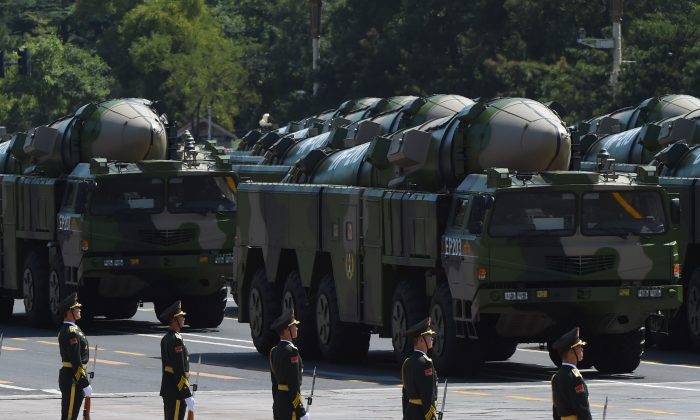Source Link
Daniel Ashman
China is building specialized nuclear warheads so potent that a single one may be enough to devastate America with its enhanced electromagnetic pulse (EMP), according to a report the Department of Defense (DoD) recently declassified.
The report, Nuclear EMP Attack Scenarios and Combined-Arms Cyber Warfare, was written by Dr. Peter Vincent Pry for a congressionally mandated commission investigating the threat from EMPs to the United States.
The report warns that future wars may look entirely different than past wars due to people’s increasing reliance on technology. China, alongside Russia, Iran, and North Korea, have recognized America’s extreme reliance on electricity, electronics, and technology, and subsequently adapted their military plans to target this dependence.
Detonation of a single generic nuclear bomb between 30-400 kilometers above earth will create an EMP that propagates outward towards earth with a radius of between 600 and 2,200 kilometers. The effects of an EMP would be catastrophic and could plunge a nation into indefinite darkness. There would be widespread destruction of computers, nuclear power plants, satellites, phones, refrigerators, transformers, and more.
The EMP commission estimates a full 90 percent of the American population could die within a year of an EMP attack.
The threat posed by EMP is widely recognized at this point. For instance, in 2018 alone, both the Department of Homeland Security and a group of experts from inside the normally reticent DoD, released reports recognizing the need for urgent action, respectively titled the Strategy for Protecting and Preparing the Homeland Against Threats of Electromagnetic Pulse and Geomagnetic Disturbances, and the Electromagnetic Defense Task Force Report.
The newly declassified report is startling because it goes beyond just acknowledging the theoretical threat posed by an EMP attack. It provides alarming and concrete details on how EMP attack is actually core to the planning of various nations adversarial to America.
Chinese leaders consider the EMP attack to be a revolution in military affairs, referring to this change with such names as Sixth Generation Warfare, Non-Contact Warfare, or Electronic Warfare.
Iranian, North Korean, and Russian military doctrines closely mimic China on these points.
For instance, China’s Peoples Liberation Army (PLA) published a paper asserting that an EMP attack could be considered the “’Pearl Harbor Incident’ of the 21st century” and that the “United States is more vulnerable to attacks [from EMP] than any other country in the world.”
Another Chinese paper explained that an EMP attack could be used to destroy, “an enemy’s telephone network, fuel pipelines, electric grid, transportation control system,” and much more.
One PLA textbook explains that EMP attacks can destroy a nation’s computer networks which mean a “country will slip into a state of paralysis and the lives of its people will ground to a halt.”
In addition to traditional nuclear bombs which can generate a devastating EMP attack, China has also developed Super-EMP warheads. These are nuclear bombs that are specialized to result in a greater EMP, of up to 200 kilovolts per meter.
America’s DoD has taken limited steps to harden some of its weapons and communications systems from an EMP strike. America’s military, however, is highly dependent on civilian infrastructure to function, which the DoD has not addressed, and foreign military planners have explicitly recognized this fact.
The limited steps the DoD has taken to address the threat from EMP has not addressed the newly developed Super-EMP warheads.
Even America’s nuclear deterrent faces a direct threat from the Super-EMP weapons. In Congressional testimony in 2008, then-Congressman Roscoe Bartlett commented, “I also understand that we aren’t certain we could launch, through a series of robust EMP laydowns, that we could launch our intercontinental ballistic missiles.”
The EMP Commission Chairman responded, “We designed both the missiles and their bases and the strategic communications systems during the Cold War to be able to survive and operate through EMP fields on the order of 50 kilovolts per meter, which was our concern at the time, before we realized that weapons could be designed that had larger EMP fields.”
It’s unclear what would happen to America’s nuclear submarines if America were hit by an EMP attack.
It is common American perception that the use of a nuclear weapon is simply unthinkable. But this newly declassified report undermines such a view. China doesn’t consider a nuclear EMP strike to carry the same taboo that a traditional nuclear strike does. They view it as more related to cyber warfare and far more acceptable. Their reasoning is based on the idea that when a nuclear warhead is detonated at a high elevation for EMP effects then people wouldn’t die from the nuclear fireball or fallout.
A nuclear EMP attack poses another serious problem for America’s nuclear deterrent. For America’s nuclear arsenal to function as a deterrent, America’s government must be able to quickly and reliably determine who an attack came from.
However, in the event of an EMP, much of America’s technological equipment used to make such an assessment could be put out of operation. Further, a bomb detonated hundreds of kilometers high may leave minimum physical traces for analysis.
The report presents numerous scenarios where a global war breaks out and is won with use of an EMP.
The EMP Commission was staffed with men of unmatched expertise. It was headed by Chairman Dr. William Graham who holds a PhD in electrical engineering and was the Director of the White House Office of Science and Technology under President Reagan. The Commission further included a retired General, a former CIA Director, and among its other subject matter experts is Dr. Pry who holds two PhDs, a certificate in nuclear weapons design from Los Alamos, and ten years as an intelligence officer at the CIA.
Members of Trump’s national security team have read the EMP Commission’s work and are taking steps to mitigate some of the risks warned about. So far, however, progress has been limited, especially in the face of bureaucratic resistance from various holdovers from previous administrations.

No comments:
Post a Comment